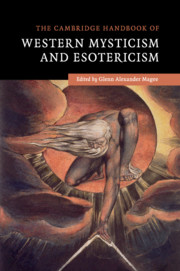Book contents
- Frontmatter
- Dedication
- Contents
- Acknowledgments
- Editor's Introduction
- List of contributors
- I ANTIQUITY
- II THE MIDDLE AGES
- III THE RENAISSANCE AND EARLY MODERNITY
- 12 Renaissance Hermetism
- 13 Christian Kabbalah
- 14 Paracelsianism
- 15 Rosicrucianism
- 16 Jacob Boehme and Christian Theosophy
- 17 Freemasonry
- 18 Swedenborg and Swedenborgianism
- 19 Mesmer and Animal Magnetism
- IV THE NINETEENTH CENTURY AND BEYOND
- V COMMON THREADS
- Suggestions for Further Reading
- Index
- References
12 - Renaissance Hermetism
from III - THE RENAISSANCE AND EARLY MODERNITY
Published online by Cambridge University Press: 05 May 2016
- Frontmatter
- Dedication
- Contents
- Acknowledgments
- Editor's Introduction
- List of contributors
- I ANTIQUITY
- II THE MIDDLE AGES
- III THE RENAISSANCE AND EARLY MODERNITY
- 12 Renaissance Hermetism
- 13 Christian Kabbalah
- 14 Paracelsianism
- 15 Rosicrucianism
- 16 Jacob Boehme and Christian Theosophy
- 17 Freemasonry
- 18 Swedenborg and Swedenborgianism
- 19 Mesmer and Animal Magnetism
- IV THE NINETEENTH CENTURY AND BEYOND
- V COMMON THREADS
- Suggestions for Further Reading
- Index
- References
Summary
Hermetism: A Definition
“Hermetism” (adjective: “hermetic”) has two complementary meanings. First, it designates the works known as the Hermetica, written in Greek at the dawn of our era in the region of Alexandria. The term “Alexandrian Hermetism” is often used to refer to these works, which deal with matters such as cosmology, spiritual illumination, and theurgy. A collection dating from the second and third centuries CE, dubbed the Corpus Hermeticum (henceforth CH) at the beginning of the Renaissance, stands out within this body of works. It is composed of seventeen short treatises, which were oftentimes to be edited along with the Asclepius, and the fragments attributed to Stobaeus. Their “author” or inspirer is the legendary figure Hermes Trismegistus, or Hermes the “thrice great,” associated in many different (and conflicting) mythical genealogies with the Egyptian Thoth and the Greek Hermes.
In the expression “Neo-Alexandrian Hermetism,” however, Hermetism refers to the various works, adaptations, and commentaries that stand in the philosophical or religious wake of the Hermetica, particularly of the CH, in the Middle Ages but principally from the Renaissance until the present day. The term “Hermeticism,” which is vague, is frequently used as a synonym for esotericism and also for alchemy.
Rediscovery and First Publication of the CH at the Dawn of the Renaissance
In the Middle Ages, there had been no dearth of literature following in the tradition of the Hermetica and/or inspired by the figure of Hermes Trismegistus, but the CH itself had been lost since around the fifth century (save for the Asclepius, originally known in Greek as Logos Teleios, which survived in an ancient Latin translation only). Around the year 1460, a monk named Leonardo da Pistoia discovered fourteen treatises of the CH in Macedonia. These had been gathered together in the eleventh century, and it was in this form that the Byzantine Platonist Psellus had known them. Pistoia brought the treatises to the ruler of Florence, Cosimo de’ Medici the Elder, who had entrusted Marsilio Ficino with the creation of a Platonic Academy. Cosimo and Ficino had intended to have the available writings of Plato translated into Latin; however, when they learned of these fourteen treatises (CH I–XIV), Cosimo insisted that Ficino temporarily set aside his Latin translation of Plato and work on the hermetic texts instead.
- Type
- Chapter
- Information
- The Cambridge Handbook of Western Mysticism and Esotericism , pp. 133 - 142Publisher: Cambridge University PressPrint publication year: 2016

